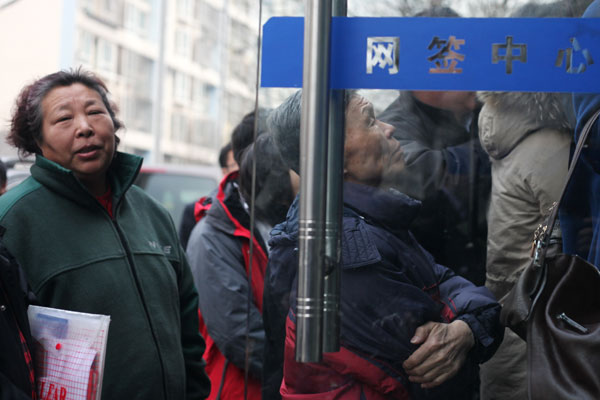
|
 |
|
People line up outside the housing authority in Beijing's Chaoyang district on Tuesday, waiting to get advice about secondhand housing transactions or wrap up a deal. [Wang Jing / China Daily] |
China's latest property market curbs have stirred heated discussion, with experts close to policymakers saying China will try to control the side effects of the measures.
The central government announced last week that home owners who sell their homes will have to pay an income tax equivalent to 20 percent of the profits they make on the transaction. The income tax for such sales is currently 1 to 2 percent of the sale price.
Qin Hong, a researcher with the Ministry of Housing and Urban-Rural Development, said those who sell their only home after five years of use will be exempt from paying the tax.
She said the tax exemption will support reasonable housing demand and help control speculation.
"Though some people are worried about the tax, the policies have listed several preferential terms for people who bought new houses to improve their living conditions," said Qin, as quoted by the People's Daily on Thursday.
Jia Kang, a researcher with the Ministry of Finance, said local governments should make clear regulations in accordance with the policy and prevent non-speculative buyers from being hurt by the tax hike.
Local governments are to release their own detailed regulations in line with the guideline by the end of March.
The top housing authority also promised to protect non-speculative buyers from being hurt during the implementation of the policies.
"People complained some speculators gained fat profits because of soaring housing prices, so the government released this income tax on home sales," said Vice-Minister of Housing and Urban-Rural Development Qi Ji, in response to the heated discussion on levying a 20 percent income tax on home sales.
"Whoever gains from property sales should pay the tax," he said.
Qi said on Monday that if the measures create problems during their implementation, the authorities will adjust them in a timely manner.
Yin Bocheng, director of the real estate research center at Fudan University, said the tax will prove effective.
"The people who possess more properties will pay more tax on sales, cutting their profits a lot, which will make them throw less money into real estate," he said.
But many residents have concerns that the high taxes may result in another round of price hikes, as the new tax burden could easily be transferred from homeowners to homebuyers.
On the day after the measures were announced, sales of secondhand homes in Beijing reached a record high of 1,059 units.
Deng Lina is one of those buyers who rushed to secure a home before the tax is introduced. She found an apartment within a week and signed the contract on Tuesday in Shenzhen.
"I sold my old house in my hometown to pay for the down payment, but I could not wait to see if the price was going to rise higher," she said, adding that many of her friends are looking to buy properties now.
Hu Jinghui, vice-president of bacic5i5j.com, a leading property brokerage company, warned the increased costs may be shifted to homebuyers over the long term.
Qin said the shift will depend on housing supply and demand.
She said in a buyer's market, a tax shift will be relatively hard, while in a seller's market, where supplies of secondhand homes are limited, it will be much easier for sellers to pass on the increased cost to buyers.
Shen Li, a broker with HomeLink, another property brokerage firm, said her company puts secondhand home transaction taxes on buyers instead of sellers.
Jiang Weixin, minister of housing and urban-rural development, said on Monday that the ministry will wait to see what effects the new measures will have, adding that he is confident housing prices will be contained.
Xinhua contributed to this story.







